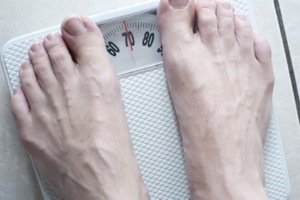Nutrition
What’s a reasonable rate of weight loss?
Most people, when they start an exercise and diet program, focus on one number – their weight. Standing on the scale each day, or even more often, becomes an obsession. Every kilogram or pound that comes off is a victory and any increase can be very discouraging.
 One thing to remember is that your weight can fluctuate each day by a kilogram or so (I’m staying metric – 1kg = 2.2lb) because of hydration or recent meals that haven’t made their way through your digestive tract. Also, you’ll find that your weight changes through the course of the day and even if you move your scales. I can gain and lose weight simply by moving my scales from one part of the bathroom floor to another.
One thing to remember is that your weight can fluctuate each day by a kilogram or so (I’m staying metric – 1kg = 2.2lb) because of hydration or recent meals that haven’t made their way through your digestive tract. Also, you’ll find that your weight changes through the course of the day and even if you move your scales. I can gain and lose weight simply by moving my scales from one part of the bathroom floor to another.
There’s no hard and fast rule as to the best rate of weight loss. In my case, the first few kilograms came off quite quickly but things then slowed down to 0.5kg or less per week. There have been weeks when the weight loss stopped but it then resumed.
It’s not just weight you should track
As well as tracking your weight I’d suggest doing a couple of other things.
1. Take regular measurements: Using a a tape measure, record your chest, waist, hips, thigh, calf and arm measurements. Once you’re exercising you’ll find that your body will change faster than the scales. Although you’ll become leaner, and consequently your measurements will shrink, your weight might not follow suit.
2. Don’t worry about daily fluctuations: Your weight will fluctuate each day – that’s a fact of life. Pay more attention to the trend rather than any one reading.
There are several other measures such as BMI that people use as a measure of their body fat. However, that measure isn’t of much use for people that exercise. As your muscle mass increases your weight will increase as muscle is heavier than fat. As a result, it’s possible to be quite lean but have a high BMI.
My doctor focuses on just one measure – waist size. There are strong correlations between waist measurement and health issues such as heart disease.
Whatever you choose, remember that your weight is just one dimension of your health. It’s one indicator amongst many of the progress of your exercise program.
Debunking Food Myths
The Dynamic Duo have pulled together a humber of experts to look at the 15 Nutrition Myths You Want to Know.
 Amongst the myths they debunk are
Amongst the myths they debunk are
- When should you eat protein after a workout and is there a limit to how much protein your body can process?
- What sort of cardio will help you get shredded
- Are there any “magic” foods?
- Does the time you eat matter?
